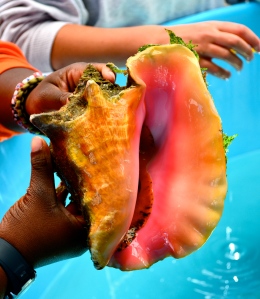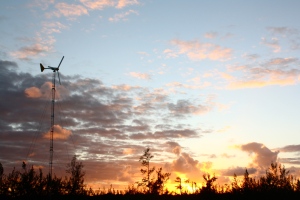In preparation for my three-hour block of Marine Ecology yesterday afternoon, I made sure I had my mask, snorkel, and fins. I started heading over to the boathouse to arrange my dive gear, when a friend let me know that I wasn’t diving that day. I was going to snorkel in mangroves. Mangroves are a type of tree that live in muddy areas in shallow salt water. At high tide, they flood, and juvenile marine species like conch, checkered pufferfish, blue crabs, and blue chromis swim into the mangrove looking for food and shelter. Mangroves act as a sort of nursery for the baby fish. There is a bounty of algae for the fish to feed on and plenty of protection within the prop roots around the mangrove. Continue reading
heading over to the boathouse to arrange my dive gear, when a friend let me know that I wasn’t diving that day. I was going to snorkel in mangroves. Mangroves are a type of tree that live in muddy areas in shallow salt water. At high tide, they flood, and juvenile marine species like conch, checkered pufferfish, blue crabs, and blue chromis swim into the mangrove looking for food and shelter. Mangroves act as a sort of nursery for the baby fish. There is a bounty of algae for the fish to feed on and plenty of protection within the prop roots around the mangrove. Continue reading
Lionfish Research Project Update: The First Week
The first week of research was a big week for the Lionfish research project. We oriented ourselves to our goals, methods, and systems. We discussed what an invasive species means, the invasion of lionfish, their life cycles, and their anatomy. On Thursday, we dissected lionfish in the lab. Our project began with learning external anatomy, including how to prevent lionfish stings. Next cut their bellies and look into the internal anatomy. We saw their key organs, and even their super stretch stomach that makes them such a successful predator. I found it especially interesting when we opened their stomach; we identified their stomach contents. This is especially significant because we identified their stomach contents to determine which species were suffering due to lionfish predation. I really enjoyed our dissection. The following week was our first field day. We went diving on a reef and practiced protocol for surveying a particular reef. The group was really excited to begin their work and get in the water. Stay tuned for new updates from the Lionfish research project!
[slideshow]
Conch Research Project Update: Our First Day in the Field
by Amelia Patsalos-Fox, Shane Wetmore, Sterling Wright
On Saturday we went out to free dive for conch in the shallows near the sandbar to see how many adults we could find. It was a nice first experience for us and it taught us how to find conch even when they are camouflaged in the sand. For the past week we have been focusing on queen conch identification, history of the conch fishery, and ways to survey the population effectively. Our most exciting experience so far has been in the field. We were able to travel out into Cape Eleuthera Sound and take our first peek at some conch. As we snorkeled around, we practiced our free diving and determining live queen conch from dead shells. We mostly saw juveniles and a few sub-adult sizes. We then gathered in a group in the water to practice identifying differences between juvenile and sexually mature conch shells. This was very helpful in learning about the shells. It was extremely hands on and we had the help of a visiting conch researcher, Catherine Booker, from Community Conch, a Bahamian non-profit organization. She had given us a presentation previously on conch in the Bahamas and it was amazing to see her teach us about proper ways spot conch. All in all it was a positive experience and was very helpful towards our future in surveying the density of conchs in the Cape Eleuthera Bite.
[slideshow]
The following week we were able to go out and start experimenting with collecting real data. Our project hopes to identify Continue reading
Daily Update April 3, 2012
 Sustainability is a pillar of The Island School. In every class here, we discuss sustainability, how to achieve it, and how to improve the world and make it more sustainable. Although at home, I’ve had many classes on “going green,” I’ve realized that the concept is much more than just turning lights off when you leave the room. It’s about empowering the current generation to use resources and meet their needs while saving enough for future generations.
Sustainability is a pillar of The Island School. In every class here, we discuss sustainability, how to achieve it, and how to improve the world and make it more sustainable. Although at home, I’ve had many classes on “going green,” I’ve realized that the concept is much more than just turning lights off when you leave the room. It’s about empowering the current generation to use resources and meet their needs while saving enough for future generations.
In Human Ecology on Monday, we started brainstorming ideas of Final Projects. These projects will be about solving problems by creating more ecologically-friendly systems, either on campus or at home. Continue reading
Eleutheros
The Human Ecology, Histories, and Literature Departments have collaborated on a series ongoing personal reflective essays called Eleutheros. Each week students are asked to write a reflective essay that demonstrates their understanding of the themes from their coursework and effectively links these themes to their unique thoughts and experiences. Enjoy reading these two articulate examples of how our students have deeply and personally engage with essential questions, important to their course of study at The Island School…
Prompt: Why is the sea valuable? Discuss different individual and cultural perspectives on the sea. Consider how your life experiences, as well as your learning in Histories, Literature, and Human Eco have impacted how you understand the value of the world’s oceans.
Mac McDonald:
My paddle dug into the muddy waters of the Mekong Delta, as I maneuvered amongst the floating homes. The children waved from the doorway of their school. Their school pitched in the ripples made by our canoes. The plastic jugs and Styrofoam, keeping the structure afloat, grumbled and moaned. Behind them I could see the desks, world maps, and chalkboard. Underneath the homes lay a world of sustainability. Giant nets filled with fish created the possibility of all this happening by creating an income for the village. Observing this world and perceiving how they utilize the sea through transport, income, religion, and as a base for their home, completely changed my thoughts on the ocean. I was able to realize how diverse the value of the sea truly is and in how many ways it can be manipulated for use. Continue reading
DCMS Community Outreach Project on Lionfish
Deep Creek Middle School student, Yanni Giannakopulous (grade 9) is leading both Island School and DCMS students through a project to educate local fishermen and restaurant owners on Eleuthera about the market for Lionfish. At the conclusion of the project, the students plan to hold an educational outreach event at a local restaurant where they bring together suppliers and consumers to learn more about how to cook the fish and create a market for this invasive species.
In order to prepare for this final event, the students heard a presentation by Nicola Smith from The Bahamas Department of Marine Resources. She shared some of the latest research on the species. The students are also learning all about safe handling of the lionfish, since their spine rays are venomous, from lionfish researcher at CEI and alumna, Skylar Miller (S’03), as well as delicious preparation of the fish from Island School sustainable chef and alumnus Emery Long (F’04), shown in the photos below. During this Community Outreach class, the students were being filmed by ZED, a French documentary film company who are currently on campus. ZED specializes in natural history, science and adventure and has been working on an invasive species documentary featuring lionfish and will be shooting lots of underwater footage with the lionfish research team at CEI.
[slideshow]
Daily Update April 2, 2012
Weekends are some of the best times here – they give us time to relax, bond, get some homework done, and try new things. After a long exercise track, we headed off to a morning of classes, followed by an afternoon in our settlements. I rode in a van over to Tarpum Bay, where I spent the afternoon talking to fisherman, eating conch salad, and spending time with my settlement mother. It was sad to leave from our final settlement Saturday, but I’m so glad I got the chance to go to Tarpum Bay. I’ve learned new things about Bahamian culture, like saying “Good day” every time I pass anybody in the street, and the history of Eleuthera from the days I spent there.
[slideshow]
Saturday night was our first coffeehouse. Continue reading
Daily Update March 30, 2012
Wednesday afternoon was a four-hour research block. Whether you were out diving after sea turtles or towing behind a boat counting 
conch, the afternoon was fun and fascinating. My group, deep water sharks, spent the afternoon examining footage from the Medusa, a high-tech machine lent to us exclusively this semester that drops thousands of feet underwater and takes footage of what it sees. At 1800 feet, we caught a few Cuban dogfish sharks on tape, but the real excitement came when a 6-foot long blunt nose six-gill shark crashed into the camera and circled it for investigation! It was amazing to see a creature that most people never get to see in their lives up so close.
Although Wednesdays are our longest workdays, I caught some relaxation this morning during morning exercise. Continue reading
The Maxeys Finally Make it Out West
Pam and Chris made their first trip out to California this week and had the opportunity to reconnect with old friends, as well as meet some prospective Island School students. Chip and Melanie Vetter (IS Parents of Anne (S’11) and Matt (S’09)) held a gathering at their home in Kentfield, CA. Over 40 prospective students, Island School alumni, faculty alumni, and friends were in attendance! Thank you to all who came out and especially to the Vetters for hosting such a great evening!
[slideshow]
Daily Update March 29, 2012
A highlight of my week so far was the Marine Eco dive my class did yesterday. We gathered our scuba gear and drove boats out to a patch reef, which is a home for juvenile fish before they move to big reefs. We observed the different fish, worms, mollusks, and crustaceans carefully and identified as many species as we could. The coolest part about Marine Eco is learning about a species in class and then actually diving and seeing it in real life. I can’t wait for our next dive!
[slideshow]
Today, I was confronted with a decision at about7 AM. After pushing myself about a mile and a half down the road, I was jogging in place at a fork with my running buddy, Liz, deciding between either the 3.5-mile run or the 5-mile challenge. After about 30 seconds of back and forth, I suddenly bounded through the 5-mile entrance, Liz right next to me. We decided our goal was to finish the run faster than we had ever run long distance before. Continue reading
